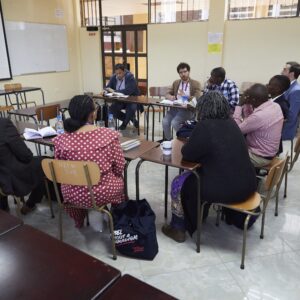
- This project has passed.
The Global South in the electric vehicles global value chains
YSI-Gerpisa Panel
Start time:
June 27, 2023
EDT
Location:
YSI-Gerpisa Panel, Ixelles, Bruxelles, 1050
Type:
Other

Local Partners
Description
The 2008-2009 economic crisis interrupted the expansion of Global Value Chains (GVCs) as different manufacturing reshoring processes were registered, that then were deepened by the Covid-19 pandemic. This was accompanied with a re-emergence of industrial policy in developed and developing countries. In the automotive industry, this crisis generated a general shift in output in favour of non-core areas of global automotive production.
Likewise, driven by rapid technological innovations and climate change, the global automotive industry is experiencing different transformations focused on the development of more Connected, Autonomous, Shared & Electric (CASE) vehicles. In this context, the production and sales of Electric Vehicles (EVs) has been increasing since the international crisis of 2008-2009 due to specific regulations in the major centers of production and consumption, that aim to reduce and replace fossil-fuel vehicles. Moreover, despite the debate about the pace and level of these changes, there is a consensus that this process will continue to increase as road traffic has to be largely decarbonized to keep global warming within manageable limits. This shift implies major modifications in the way that cars are constructed and automotive value chains organized, opening up opportunities for newcomers at the level of firms and nations.
Most of these changes are concentrated in the main economic centers. In particular, China, Europe and the United States account for nearly two-thirds of the overall electric car market and their aggregated sales represented 95% of total electric car sales in 2021. Moreover, these modifications are causing an increasingly race among the most industrialized nations and their multinational companies (MNCs). China leapfrogging strategy is an example of this competition as it attempts to take advantage of this global trend to become a technological leader in the emerging EV market. This also accounts for the related EV industries, such as the lithium-ion battery (LIB), whose production capacity was 77% concentrated in China in 2020. However, the upgrading possibilities for smaller developing economies in this new context are not clear yet.
Basically, most of the research on the relationship between environmental policies and economic opportunities has focused on advanced industrialized countries, and little evidence exists for developing countries. Initially, the green transformation, like the transition to electromobility, may be more conducive to leapfrogging than many previous system-wide paradigm shifts. This is because the green transformation is mainly policy-driven. Hence, policymakers have exceptional leeway for influencing the speed of the green transformation in their home economies, and they can combine environmental and technology policies strategically to catch up with technological leaders in strategic industries. Nonetheless, the major EV production and consumption is occurring in the core areas. This implies the danger that when the Global South would try to insert itself in the new paradigm it will depend on technologies and capabilities from the Global North.
Therefore, this panel invites researchers to present papers focused on how the peripheral countries are taking advantage of this window of opportunity. Based on this, the panel proposes to compare the different national strategies that developing countries are implementing in the transition to electromobility. Thus, these presentations will allow the attendees to discuss the differences and similarities in these paths as well as the difficulties and challenges for the development of the EV value chain in these countries.
In particular, the project aims to have a special YSI panel in the 2023 Gerpisa Colloquium on June 27 and the organization of a Pre-Colloquium YSI meeting on June 26. A limited budget is available to cover several travel stipends for presenters within the region. Fill the form to apply for a travel stipend.
